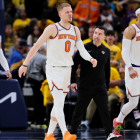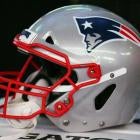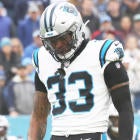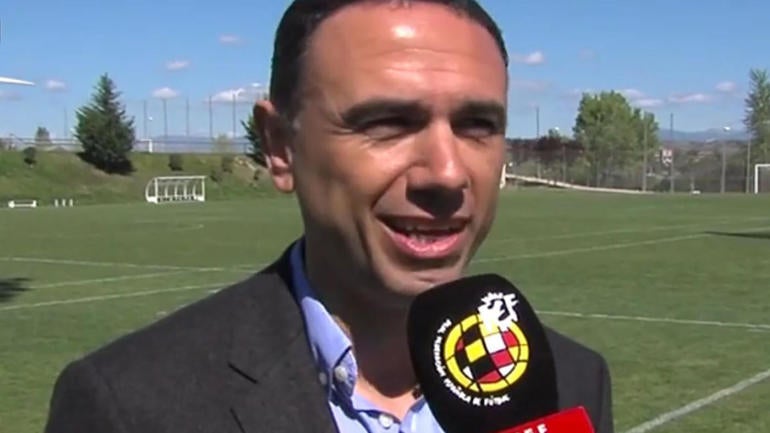
Moments after Gabriel Martinelli had stunned Stamford Bridge with his majestic solo goal in January, Francis Cagigao's phone started pinging. First once, then again, then a flurry of messages, WhatsApp messages and texts flying his way, all in response to one tweet by a former Arsenal player.
"Francis Cagigao strikes again," wrote former Arsenal and Chelsea midfielder Cesc Fabregas after Martinelli had left N'Golo Kante flat-footed on his way to a goal of the season contender.
"And Francis Cagigao strikes again and again," was Fabregas' second tweet after Hector Bellerin had earned the 10 men of Arsenal a draw at Stamford Bridge. "Legend."
For Cagigao, a man who spent 24 years in north London largely operating in the shadow and avoiding any great publicity, there was only one possible response.
"I just remember being embarrassed as the phone and the WhatsApps started going," Arsenal's former head of international recruitment tells CBS Sports. "I appreciate Cesc and I've got a very, very good relationship and a strong bond with him.
"But yeah, at the time, I felt a little bit of awkwardness. You know, when that happened, I didn't expect it at all."
Perhaps he should have seen it coming. After all there is widespread admiration for Cagigao's two decades-plus of work at Arsenal, which came to an end in September after technical director Edu Gaspar restructured the club's recruitment department and released many of its top talent spotters.
Even after his departure, Cagigao's influence was felt in the signings of Gabriel Magalhaes and Thomas Partey, both understood to be top targets identified by the international recruitment department he led. He played an integral role in overhauling the database that the club will use over the coming years.
Before then, he had run the rule over generations of top Arsenal talent, from Bellerin and Martinelli to Lauren, Jose Antonio Reyes, Santi Cazorla and Emiliano Martinez.
The story of Cagigao finding Fabregas is well known and the scout himself would acknowledge that he did not "discover" one of the star players in a youth team that included Lionel Messi and Gerard Pique.
Fabregas' enduring respect for Cagigao does not stem from the scouting work that brought him to Arsenal in 2003 but what happened next.
"If you've been the person that's sold the idea of the club well -- obviously along with people, like Arsene Wenger and Steve Rowley at the time, who did a great, great job at the club in his time as chief scout -- I think you build this bond," Cagigao says. "Number one, you want to help them.
"I think the first year, that help was constant, whether it be text messages to say that you're playing against this type of player, it's that type of player careful with this, or you might want to give them a few tips on on the weaknesses and strengths of people is playing against.
"To his credit, he was always someone who was very willing to learn, would ask questions, would want information. I remember I used to speak to him and say 'how do you think you did?' He'd never say he did well and that's a testament to his drive.
"You build a repartee with players. They don't forget the people that helped them along the way."
When Cagigao found a player like Fabregas he would not hesitate in letting his superiors know. Dick Law, the club's chief negotiator between 2009 and 2018, told the Athletic in April: "The world of scouting has tonnes of people who will qualify their opinion. They'll say, 'This is a great player, but ...'. With Franny it's 'this player is this rubbish' or 'this player is good'. And he stands by his opinion."
Cagigao might push back on the notion that every player was either "rubbish" or "good" and would acknowledge there are players that prompt moments of doubt. He is, however, well aware that he is not serving anyone's interest by keeping his counsel.
"You're very much being paid to give your opinion. So to be paid to sit on the fence, every time you see a player, it's not going to work for the football club, and they're not going to be getting value for money.
"You have to make yourself heard, if you believe very strongly in something. Some people could suggest that there's a touch of arrogance behind that. I don't think there's any arrogance whatsoever behind it. I just think that if you're paid to give an opinion, you must give your opinion."
He has been right more often than he has been wrong.
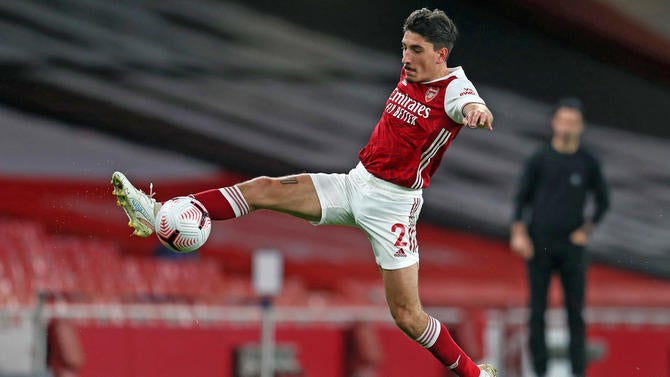
More than just their talent, what has stood out among many of the players Cagigao has unearthed for Arsenal is the deep bond they have subsequently developed with the club. Fabregas, Bellerin, Cazorla and Martinez have no particular pre-existing ties with north London; they may have admired the Gunners from afar but they did not grow up supporters.
And yet they appeared to find something unique at Arsenal and developed a great connection for the club, one reciprocated by their supporters. It is not just that Cagigao finds good players, but that he found men who were the perfect fit for his club.
Cazorla is "a genuine, lovely fella, apart from being, you know, an outstandingly, exceptionally talented footballer."
Cagigao can still reel off his first experience watching Martinez, a 1-1 draw between Argentina and Ecuador in Iquique, Chile, during the 2009 South American Under-17 Championships. On that day he saw the footwork, strong hands, size, and "subtle manipulation" of the ball that would see him develop into a player he now believes ranks among the top 10 goalkeepers in the world.
More than that, he is enamored with Martinez's attitude after 10 years waiting for his chance to come at Arsenal. "He has always bounced back. And he has always been self confident. And he has always been cheerful and hard working.
"So I think if anybody's, you know, if anybody has deserved this success, which has come a lot later than we thought, it's Emi."
Many of the great personal attributes he has spotted in these Arsenal signings are universal but he would acknowledge that he is yet to find out how effectively his experience with the Gunners can translate to his next steps. The 50-year-old has not found his permanent new home, though he will be consulting with two North American clubs, Barrie FC 1812 in Ontario, Canada, and Atlantic City FC of the National Premier Soccer League.
Cagigao believes that North America and the Caribbean are the areas "with the most scope for growth" and has kept a close eye on the top talent developing in the region over recent years. For instance, he reveals Arsenal had been weighing up a move for Alphonso Davies before Bayern Munich beat them to the signature of the Canadian of the 19-year-old.
In the future, he believes that top European sides may not find it so easy to snare MLS' best talent.
"The next chapter will be for American sides keeping their own talent," Cagigao says. "That's the next chapter. Instead of exporting and importing it's developing and keeping. If you're talking about expansion and a country becoming a solid football nation you have to learn to keep.
"At the moment, perhaps the pay structure in MLS doesn't afford them the license to do that, but eventually I can imagine that will come.
"As the league becomes bigger and has more scope, presence and prestige, I imagine players will stay in their own clubs. A measure of how strong a league is, in my opinion, how many homegrown players can stay and play in their own country."
Francis Cagigao strikes again
— Cesc Fàbregas Soler (@cesc4official) January 21, 2020
And Francis Cagigao strikes again and again. Legend.
— Cesc Fàbregas Soler (@cesc4official) January 21, 2020
As for his own work, it will be a challenge, Cagigao acknowledges, to adapt his methods to his next club. He has retained databases of his own and used the game's temporary lockdown in the spring and summer to sharpen his mind on matters elsewhere.
Whilst delving down rabbit holes of leagues he might never have perused before proved to be rewarding for Cagigao, it also served as a healthy reminder that what might be considered "old school" scouting techniques are no less important even in an era where so many football matches are available to anyone with a screen.
"What I learned [from lockdown] was that live scouting is more important than ever. Screens track the ball. So there are parts of the game that you miss. I missed not being at live games, and not being able to go into detail sometimes of players off the ball movements and off the ball decision making, which you're not always able to appreciate it on a screen."
Cagigao departed Arsenal as the Gunners' scouting department was significantly trimmed down, with Edu Gaspar insisting he wanted to work with a smaller team and put greater emphasis on data. "Less people with much more responsibilities," is the mantra of this new Arsenal.
Arsenal's smaller team begs one question above all others. In a marketplace that is as competitive as it has ever been, can clubs spot as many top young talents with fewer eyes? It is one that will take several recruitment cycles for Arsenal to answer.
For Cagigao, data and analytics appear to be tools for informing evaluations rather than how decisions should be made. The man who designed the club's own database does not question its value but does not see it as a starting point for doing his job effectively.
"Being a good scout doesn't start with data," he explained. "It's not linked to data. Being a good scout starts with, in my opinion, having experienced knowledge of the game.
"I don't believe there's a special eye, but I do believe in the trained eye. And I do believe in the experienced, trained eye. And then I do believe in the experienced, trained eye with a track record."
Whoever manages to secure Cagigao's services next will doubtless have that. And if he can unearth another generation of Martinellis, Bellerins and Cazorlas, he will prove to be an invaluable addition to his next club.













